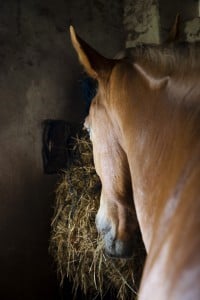 In the winter, adverse weather conditions often mean that horses have to live in more, stabled for the majority or even all of the day. Horses that spend so much time in the stable have greater exposure to dust particles, which are present in forage, bedding, dried mud, and scurfy coats. These particles are inhaled, and in a healthy environment they will be trapped by cilia and mucous in the upper respiratory tract, and removed. If the stable environment is too dusty, the respiratory system is overloaded, which impairs usual function causing irritation and inflammation, which in turn restricts the airways, increasing the risk of coughs or respiratory issues. If ventilation in stables is poor or bedding/forage is dusty this risk of respiratory problems is much higher! If your horse has to be stabled more frequently over the winter, following these tips can help your stabled horse to maintain optimum respiratory health:
In the winter, adverse weather conditions often mean that horses have to live in more, stabled for the majority or even all of the day. Horses that spend so much time in the stable have greater exposure to dust particles, which are present in forage, bedding, dried mud, and scurfy coats. These particles are inhaled, and in a healthy environment they will be trapped by cilia and mucous in the upper respiratory tract, and removed. If the stable environment is too dusty, the respiratory system is overloaded, which impairs usual function causing irritation and inflammation, which in turn restricts the airways, increasing the risk of coughs or respiratory issues. If ventilation in stables is poor or bedding/forage is dusty this risk of respiratory problems is much higher! If your horse has to be stabled more frequently over the winter, following these tips can help your stabled horse to maintain optimum respiratory health:
- The Stable: ensure your stable is well ventilated and keep top stable doors, windows and any vents open. Horses do not worry about draughts, and providing they are adequately rugged they will cope well even during bouts of bad weather. If you are worried about snow or rain blowing in, use turnout rugs to keep your horse warm and dry.
- Forage: a lot of hay is too dusty to feed to horses dry. Soaking hay reduces dust particles, but will also reduce the nutritional value of hay as nutrients are leeched out into the water, notably sugars and water soluble vitamins. While this is ideal for very good doers and those needing low-sugar diets, for horses in a lot of work and poor doers this is not such a good thing- and soaking is also time consuming and can be messy. Another option is to feed steamed hay, which reduces the amount of dust particles without the nutrient losses, or you could consider feeding a good quality haylage.
- Supplement: feeding a respiratory supplement can benefit horses that are stabled often through the winter by helping to expel excess mucous and dust particles.
- Bedding: sealed rubber matting in a well-draining stable will help to minimise build-up of ammonia and also help to reduce the amount of bedding needed. Choose a low-dust bedding which is also absorbent- there are various options available, so pick one that suits you and your horse, whether it is good quality straw, shavings or wood chips.
- Mucking out: muck out without your horse in the stable, and leave the dust to settle before bringing your horse back in. If you use strong disinfectants in the stable, follow manufacturer’s instructions, as incorrectly used these can also be a respiratory irritant.
- Grooming: when grooming and rug changing, it is advisable to do so out of the stable.
- Turn out: turn out is very important to help maintain respiratory mental health for your horse, so whenever possible get them out of the stable!
For any more helpful advice or feeding tips for horses that are stabled over the winter call one of our Nutritional Advisors on 0800585525, email us at [email protected], or use our online chat service available at www.feedmark.com.

